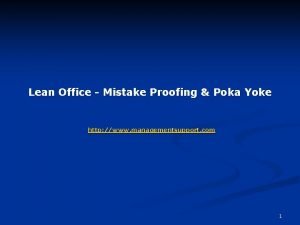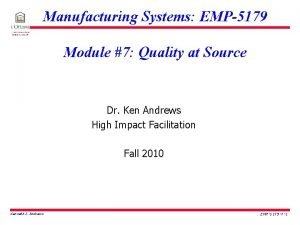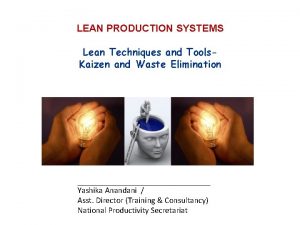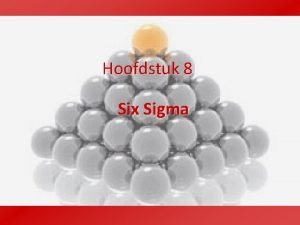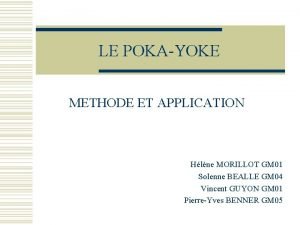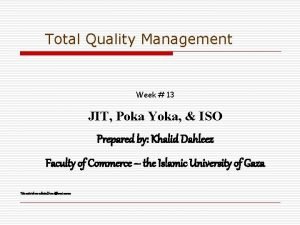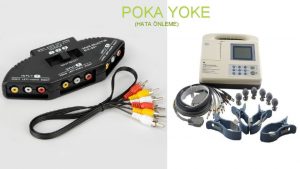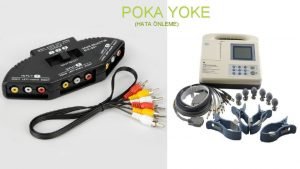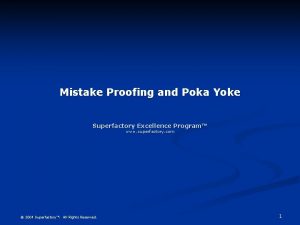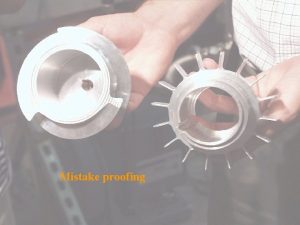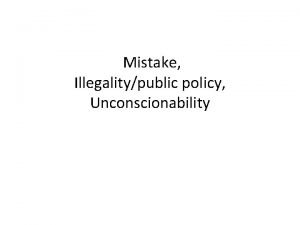Lean Office Mistake Proofing Poka Yoke http www







- Slides: 7

Lean Office - Mistake Proofing & Poka Yoke http: //www. managementsupport. com 1

Outline n n n What is Mistake Proofing? Everyday Examples Effectiveness & ROI Error Proofing and SPC Inspection Techniques Types of Poka Yokes 2

Everyday Examples 3. 5 inch diskettes cannot be inserted unless diskette is oriented correctly. This is as far as a disk can be inserted upside-down. The beveled corner of the diskette along with the fact that the diskette is not square, prohibit incorrect orientation. Fueling area of car has three error-proofing devices: 1. insert keeps leaded-fuel nozzle from being inserted 2. tether does not allow loss of gas cap 3. gas cap has ratchet to signal proper tightness and prevent overtightening. New lawn mowers are required to have a safety bar on the handle that must be pulled back in order to start the engine. If you let go of the safety bar, the mower blade stops in 3 seconds or less. 3

Individually, mistakes are rare Task Type Detection of deviation or inspection Alpha input per character Numeric input per character Assembly per task element Probability 0. 07 0. 008 0. 003 0. 00007 As a group they are common Research study #1 (Harris) Research study #2 (Rook) Research study #3 (Voegtlen) Research study #4 (Headlamps) NASA mishaps FAA Maintenance problems >0. 80 0. 82 0. 60 >0. 70 >0. 50 >0. 94 Data from “Human Reliability Data - The State of the Art and the Possibilities” Jeremy C. Williams, 1989 CEGB 4

“Be more careful” not effective n n n “The old way of dealing with human error was to scold people, retrain them, and tell them to be more careful … My view is that you can’t do much to change human nature, and people are going to make mistakes. If you can’t tolerate them. . . you should remove the opportunities for error. ” “Training and motivation work best when the physical part of the system is welldesigned. If you train people to use poorly designed systems, they’ll be OK for awhile. Eventually, they’ll go back to what they’re used to or what’s easy, instead of what’s safe. ” “You’re not going to become world class through just training, you have to improve the system so that the easy way to do a job is also the safe, right way. The potential for human error can be dramatically reduced. ” Chappell, L. 1996. The Pokayoke Solution. Automotive News Insights, (August 5): 24 i. La. Bar, G. 1996. Can Ergonomics Cure ‘Human Error’? Occupational Hazards 58(4): 48 -51. 5

Judgment Inspection n Involves sorting the defects out of the acceptable product, sometimes referred to as “inspecting in quality. ” The consensus in modern quality control is that “inspecting in quality” is not an effective quality management approach. Judgment inspection does not improve process and should be used only in the short term. 6

Seven Guidelines to Poka Yoke Attainment 1. Quality Processes - Design “Robust” quality processes to achieve zero defects. 2. Utilize a Team Environment - leverage the teams knowledge, experience to enhance the improvement efforts. 3. Elimination of Errors - Utilize a robust problem solving methodology to drive defects towards zero. 4. Eliminate the “Root Cause” of The Errors - Use the 5 Why’s and 2 H’s approach 5. Do It Right The First Time - Utilizing resources to perform functions correctly the “first” time. 6. Eliminate Non-Value Added Decisions - Don’t make excuses-just do it ! 7. Implement an Incremental Continual Improvement Approach-implement improvement actions immediately and focus on incremental improvements; efforts do not have to result in a 100% improvement immediately. 7
